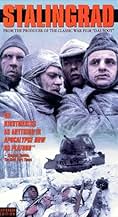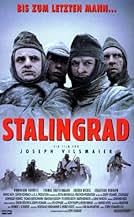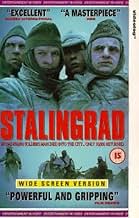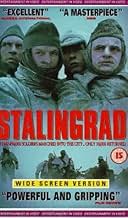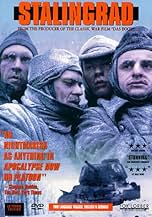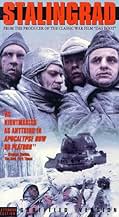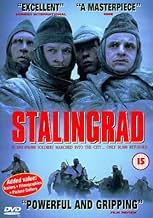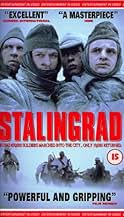1942 की गर्मियों में जर्मन सैनिकों का एक समूह की कहानी को दर्शाया गया है जो उनके इटालियन आर एंड आर से शुरू होकर, सोवियत रूस के जमे हुए मैदान से होकर, स्टेलिनग्राद के लिए लड़ाई के साथ समाप्त ... सभी पढ़ें1942 की गर्मियों में जर्मन सैनिकों का एक समूह की कहानी को दर्शाया गया है जो उनके इटालियन आर एंड आर से शुरू होकर, सोवियत रूस के जमे हुए मैदान से होकर, स्टेलिनग्राद के लिए लड़ाई के साथ समाप्त होती है.1942 की गर्मियों में जर्मन सैनिकों का एक समूह की कहानी को दर्शाया गया है जो उनके इटालियन आर एंड आर से शुरू होकर, सोवियत रूस के जमे हुए मैदान से होकर, स्टेलिनग्राद के लिए लड़ाई के साथ समाप्त होती है.
- पुरस्कार
- 3 जीत और कुल 1 नामांकन
- Pfarrer Renner
- (as Eckhardt A. Wachholz)
फ़ीचर्ड समीक्षाएं
The film revolves around four soldiers fighting in Stalingrad. They were transferred there to try and take the city. The film follows these men from August of 1942 to early 1943. During this time, they learn about the horrors of war and try to find a way out of the battle.
Through the entire film, one feels the desperation of the entire battle. Unlike "Enemy at the Gates" the film makers didn't try to put some sappy love story or dress up factual occurrences of the battle. This film may be fiction, but it conveys what happened in the bloodiest battle in World War II.
2. Screenplay has a different structure. There's no shocking opening scene like in 'Saving Private Ryan'. This movie starts slowly in a very nice place and ends slowly in a very bad place, without hope or feeling that the characters have achieved something by their heroic actions.
3. It is first a movie about lost causes in the world of war, and only secondly a war movie which takes place in Stalingrad.
4. War scenes portray the horror, insecurity and confusion of a battle, instead of how cool, heroic and exciting fighting looks like. In this sense, this movie is closer to reality than most of the war movies you will ever see. 'Thin Red Line' also had similar "I would probably crap in my pants in that situation"-feeling.
Stalingrad, whether you think it as a movie or a war movie has so many good things in it... like honesty. Even the ordinary German soldiers were dreaming about farms in Russia when they were advancing. What a disappointment they must have had in Stalingrad! If you like to watch war movies, meaning also other war movies than When We Were Soldiers or Saving Private Ryan, you should see this one. (9/10)
He's gone now, poor old fellow. He spent the last years of his life living in a Caravan/humpy on the foot of a mountain in Southern Australia, estranged from his wife, who never forgave him after she discovered he'd fathered a child to another woman during WW2 and was secretly supporting the child financially.
A kinder, more honorable man would be hard to find. I think this film succeeds in depicting the decency of the people on both sides of the conflict as well as the obligatory sadism of the Officer who ordered the firing squad shootings of Russian civilians.
It's pity the Germans still feel no WW2 Film is complete unless traces of the 'evil Nazi' are included. On the other hand it was not lost on myself at least, that the prayer scene, in which the German Army chaplain made a long point of the fact that each Wehrmacht soldier had 'God with us' imprinted under his belt buckle. While the Godless communists enemy did not.
Maybe this is a sly inclusion by the filmaker showing how European peasantry has been propagandised to hate and kill the enemy for centuries.
Stalingrad was the largest battle ever fought in human history. The Germans lost 300,000 frontline combat troops and later, the second World War. This is the best Film ever made on the subject. It is fitting that it was done by Germans.
Bernhard
It isn't well understood, but the Eastern Front was used as a threat and as a punishment by Hitler. Even Schindler in the film Schindler's List used that threat on the train station in order to get his bookkeeper released from the death train.
There are two scenes that will haunt be for the rest of my life:
The scene where Lt. Hans von Witzland, played by a very young and splendid Thomas Kretschmann, and the Russian actress Dana Vavrova who plays Irina.
That scene is so emotionally charged that it left both actors physically shaking. I can't imagine having to repeat that scene more than once. To have to hold that raw, totally exposed feeling/expression and body language while lights are adjusted and a different angle is used must have been physically and mentally exhausting for these two brilliant actors. They perform a brutal Dance Macabre that is both horrific and fascinating.
This scene is no longer about an enemy and the one who has been conquered. It is about a young man desperate to find one moment of humanity on an endless nightmare and a young woman who hates him and herself and yet can not resolve her situation. That he is a German and she is Russian is not as important as that they are both souls in torment with no way out.
The human agony of that scene is superior to anything I have seen in over 60 years of watching movies.
The other is the final scene between Dominique Horwitz and Kretschmann as Fritz and Hans clinging to each other overwhelmed and miniaturized by the vast Russian winter.
That final scene reminds me of Napoleon's death march from Moscow in 1812. The results were to same. No enemy can come marching into Russia and live to march out again.
I began watching this film firmly committed to cheering the Russians and hating the Germans.
By the end I was crying for them all.
That is the message of this fine film. War is a waste...a waste of human lives, of property, and of moral and religious focus.
This is a classic anti-war film not unlike All Quiet on the Western Front or What Price Glory.
क्या आपको पता है
- ट्रिवियाChristoph Fromm wrote the original screenplay. The producers disagreed with his more realistic direction. They had it rewritten, and Fromm took his name off the film.
- गूफ़Towards the end of film a Ju52 drops a single supply parachute. When dropped out of the plane and falling towards ground, it is green, when they recover it on the ground it is white. (In reality the Luftwaffe was first using white parachutes until they realized it is too difficult to spot white parachutes on the snowy ground.)
- भाव
Lt. Hans von Witzland: The best thing about the cold is...
[Witzland dies]
Fritz Reiser: [holding the body, he laughs] You don't have to worry about sunburn. Ever been to the desert? You'd hate it. It's so hot, you're always sweating. You think you're melting, like butter. The desert is shit. Except for the stars. They're so close, you know?
[dies]
- कनेक्शनFeatured in The 100 Greatest War Films (2005)
टॉप पसंद
विवरण
बॉक्स ऑफ़िस
- बजट
- DEM 2,00,00,000(अनुमानित)
- US और कनाडा में सकल
- $1,52,972
- US और कनाडा में पहले सप्ताह में कुल कमाई
- $10,882
- 29 मई 1995
- दुनिया भर में सकल
- $1,52,972
- चलने की अवधि2 घंटे 14 मिनट
- ध्वनि मिश्रण
- पक्ष अनुपात
- 1.85 : 1
इस पेज में योगदान दें


